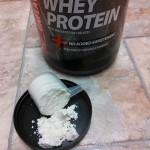 High proteins diets have recently become popular because evidence suggests they improve body composition in overweight subjects. This may relate to their ability to increase nitrogen retention, an effect that can augment increases in skeletal muscle mass. The amount of skeletal muscle mass possessed by an individual is important because it determines the resting metabolic rate (RMR) and therefore the 24 hour energy expenditure. Thus high protein diets may cause reductions in absolute body fat through increases in metabolic rate and percentage body fat through increases in skeletal muscle. Athletes are aware of the benefits of high protein diets and it is common practice in strength training circles for competitors to increase protein intake above the recommended level. That such intakes are beneficial during resistance training is well evidenced in the literature. Protein supplements are an effective method of increasing protein intake because they tend not to contain fat or carbohydrate which allows better control over macronutrient ratios.
High proteins diets have recently become popular because evidence suggests they improve body composition in overweight subjects. This may relate to their ability to increase nitrogen retention, an effect that can augment increases in skeletal muscle mass. The amount of skeletal muscle mass possessed by an individual is important because it determines the resting metabolic rate (RMR) and therefore the 24 hour energy expenditure. Thus high protein diets may cause reductions in absolute body fat through increases in metabolic rate and percentage body fat through increases in skeletal muscle. Athletes are aware of the benefits of high protein diets and it is common practice in strength training circles for competitors to increase protein intake above the recommended level. That such intakes are beneficial during resistance training is well evidenced in the literature. Protein supplements are an effective method of increasing protein intake because they tend not to contain fat or carbohydrate which allows better control over macronutrient ratios.
A large number of studies have investigated the ability of protein supplements to increase skeletal muscle mass in humans. A recent meta-analysis1 analysed some of these studies in order to determine the overall beneficial effects of increased dietary protein. The authors included randomised controlled trials (including 22 trials comprising of 680 subjects) that measured the cross sectional area of type I and type II fibre, fat mass, 1 repetition maximum, fat free mass and leg press strength with and without protein supplementation. Supplements taken by the subjects increased protein intake above 1.2 grams per day per kg body weight. The results of the meta-analysis showed that protein supplementation produced positive gains in fat free mass (+0.69 kg) and increases in 1 repetition maximum for leg press (+13.5kg), when compared to a placebo. The authors also reported that protein supplementation prolonged the training time for both older and younger subjects, when compared to those not undergoing supplementation.
Therefore protein supplements appear to be an effective solution to those wishing to increase strength and muscle mass when combined with resistance-type training. Whey protein is particularly effective at increasing skeletal muscle because it contains a relative high concentration of branched chain amino acids (BCAA). Taken after training, these BCAA enter the blood and can be oxidised as a fuel source through conversion to branched chain keto acids which enter the citric acid cycle. This has a sparing effect on the BCAA of skeletal muscle and decreases the catabolism of protein via the alanine cycle. Further, during periods of rest, the BCAA in whey protein can enter skeletal muscle cells under the influence of insulin, and thereby stimulate net protein synthesis. This can decrease the amount of time required for recovery thus allowing training of greater frequency, duration and intensity. This effect was evidenced in the above study by the prolonged training duration of the subjects taking protein supplements.
